How to lubricate a snowblower auger shaft video
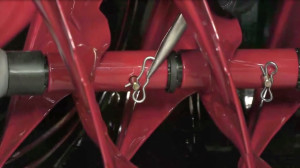

The auger shaft rotates to spin the auger blades inside the auger housing. Shear pins attach the auger blades to the auger shaft. To lubricate the auger shaft, you’ll need to remove the cotter pins that secure the shear pins then pull the shear pins out and spray the auger shaft with SNOW-JET silicone lubricant.
Lubricating the auger shaft once per snow-clearing season will help prevent the shaft and auger blades from developing excessive corrosion. Rust and corrosion can cause auger blades to seize up against the auger shaft—making it difficult to remove and replace a worn or damaged auger blade. Corrosion can also cause augers to wear out prematurely.
Lubricate the auger shaft as shown in this video.
How to lubricate the auger shaft
Pull the cotter pins out of the shear pins.
Remove the shear pins from the auger blades.
Spray SNOW-JET lubricant on the shaft, spacers and flange bearings.
Manually spin the auger blades to help spread the lubricant.
Reinstall the shear pins and secure them with the cotter pins.
If you haven’t sprayed the auger housing and chute with SNOW-JET recently, now is a good time to coat those areas with that lubricant so snow ejects efficiently from the snowblower.
Lubricating all moving parts of the snowblower
It’s a good idea to lubricate the rest of the moving parts on your snowblower at the same time that you lubricate the auger shaft.
Grease the wheel axles
Drain the fuel tank and carefully tilt the snowblower on its nose.
Use a socket wrench to remove the first wheel. Clean and coat the axle with multi-purpose automotive grease to keep it from rusting up. Reinstall the wheel.
Repeat the process on the other wheel.
Lubricate the Drive Hex Shaft
View our How to Lubricate the Drive Hex Shaft Video to see the step-by-step procedure for cleaning and lubricating the drive hex shaft.
With the snowblower still tilted forward on its nose, remove the lower frame cover from the underside of the snowblower.
Using a soft cloth, apply a coat of engine oil or 3-in-1 oil to the hex drive shaft. Be careful not to get oil on the aluminum drive plate or friction wheel. Oil on those components can cause ground drive problems.
Wipe off any excess or spilled oil from the shaft and surrounding area.
Reinstall the lower frame cover.
Tilt the snowblower upright.
Clean and lubricate the controls
Wipe dust and dirt off of the auger control and drive control pivots. Spray both of those pivots with silicone lubricant.
Clean and lubricate the auger cable bracket at the bottom of the snowblower.
Tune up the engine
After lubricating all of the moving parts of the snowblower, you can also tune up the engine so everything is in top shape.
Replace the Fuel Filter
Most snowblower owner’s manuals recommend replacing the engine fuel filter at the start of every snow season. Installing a new fuel filter ensures that the engine will get an ample, clean supply of gasoline from the fuel tank.
Check the Fuel Line
While replacing the fuel filter, examine the fuel line. Make sure there are no cracks in the fuel line and that it’s still flexible and soft.
Replace the fuel line if it’s cracked or broken.
Replace the Spark Plug(s)
Because snow blowers and snow throwers typically don’t have air filters, you’ll need to replace the spark plug (or spark plugs) at the beginning of every snow season.
Here’s a video that shows how to check the spark plug and how to install a new one when needed. Be sure to set the spark plug gap properly as shown in the video.
How To Check a Snowblower Spark Plug Video
Change the Oil
Motor oil lubricates the engine parts and helps cool the cylinder in your snowblower’s engine. Our How to Change the Oil in a Snowblower Video shows you how to replace the oil in a common snowblower.
After completing all of these tasks, your snowblower is ready for a trouble-free winter.
If you prefer to have a Sears Technician lubricate and tune up your snowblower, schedule Snowblower Tune-Up and Maintenance Service through our Sears Home Services website.
Keep your snowblower in top shape and lasting longer by scheduling snowblower maintenance and tune up service every year at the beginning of the snow season.
Symptoms for gas snowblowers
Choose a symptom to see related snowblower repairs.
Things to do: replace the spark plug, change the oil, rebuild the carburetor, adjust valve lash, adjust or replace the b…
Main causes: clogged chute, damaged auger blades, broken shear pins, worn auger belt, damaged gear case, engine problems…
Main causes: dirty carburetor, stale fuel…
Main causes: punctured tire, damaged rim…
Main causes: dirty carburetor, clogged fuel filter, dirty spark plug, incorrect valve lash, leaky engine gaskets…
Main causes: stale gas, clogged carburetor, clogged or broken fuel line, dirty spark plug, bad rewind starter, incorrect…
Main causes: loose drive clutch cable, damaged drive clutch cable, worn friction disc, scraper blade scraping the ground…
Main causes: snow build-up in chute, chute drive mechanism failure, bad chute control assembly…
Main causes: clogged chute, snow build-up in auger housing, broken auger shear pins, auger drive belt needs adjustment, …
Repair guides for gas snowblowers
These step-by-step repair guides will help you safely fix what’s broken on your snowblower.
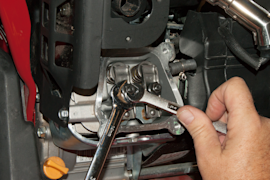
How to adjust snowblower engine valve lash
Adjust the engine valve lash on your snowblower to keep the engine starting and running smoothly.…

How to adjust snowblower skid shoes
To prevent snowblower auger and shave plate damage, adjust the skid shoes regularly to keep the shave plate ¼-inch high.…
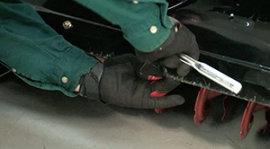
How to replace a snowblower shave plate
Follow the 7 easy steps in this repair guide/video to replace a worn out shave plate on your snowblower.…
Articles and videos for gas snowblowers
Use the advice and tips in these articles and videos to get the most out of your snowblower.
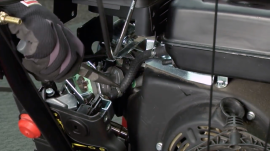
Get an overview of the main steps in a snowblower tune-up and click to videos with more details.…
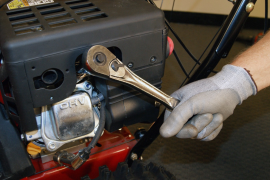
Get your snowblower ready for winter before winter arrives, so you don't have to mess with it while snow piles up.…
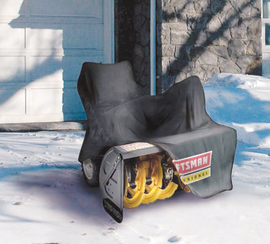
Protect your snowblower's engine and body by preparing it for after-season storage.…